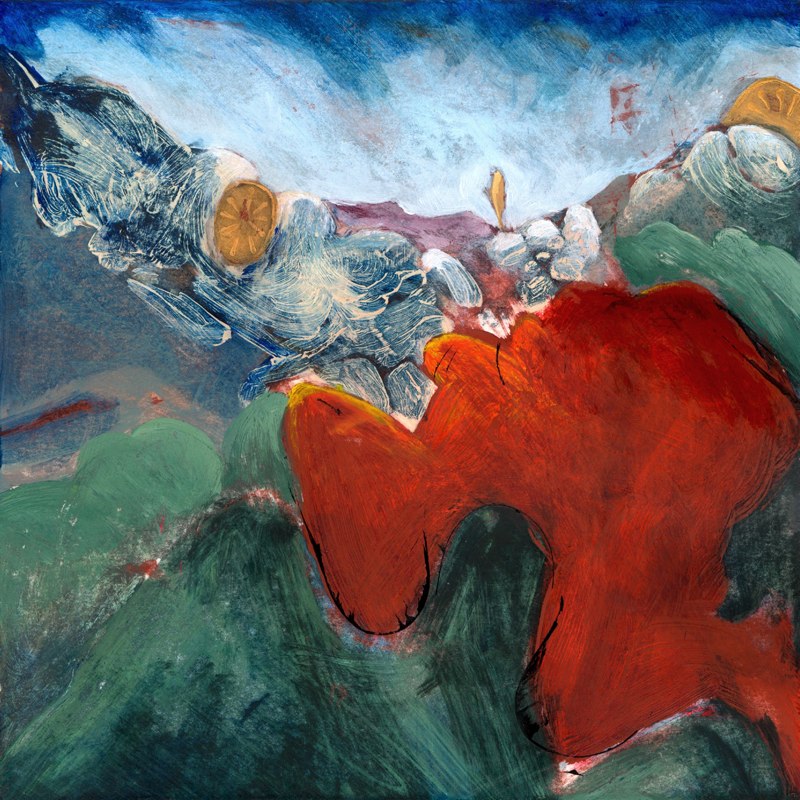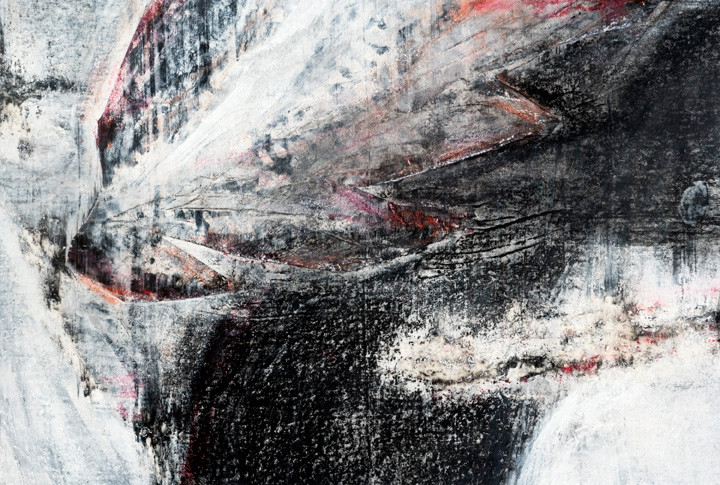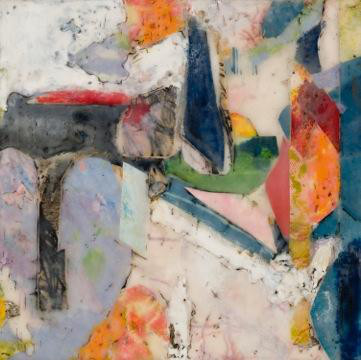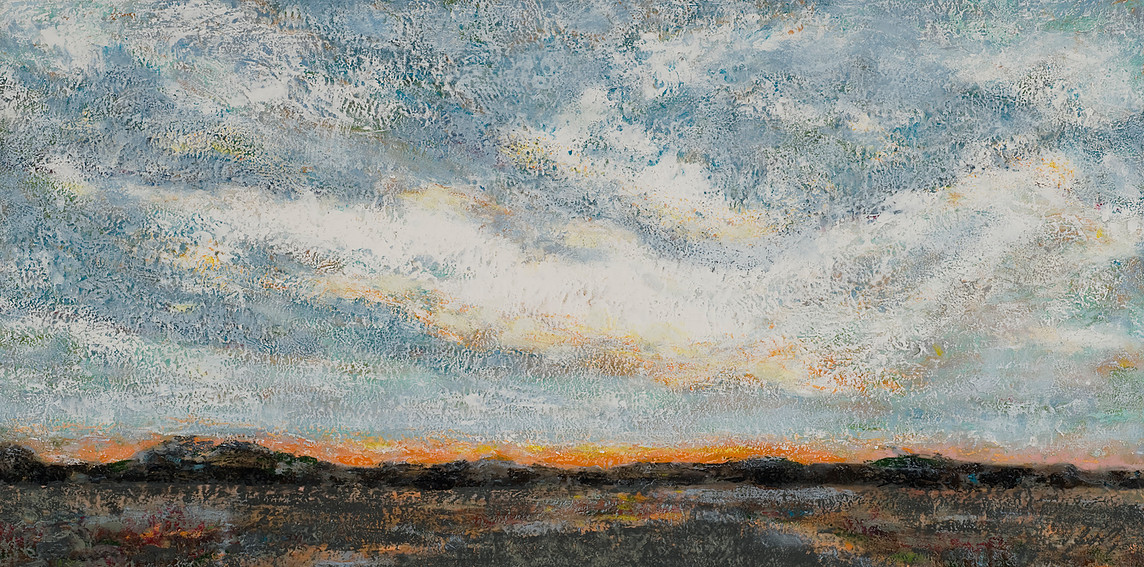
“Lost Dreams” by Jean Banas, acrylic on canvas, 47″ x 55″.
The neighbor to the south was a single woman in her forties, Annie, who heard the sirens at close to midnight. Grateful for the cool air breathing through the front door screen, untroubled by the insomnia, which had become her bed partner since her divorce (and would be, she predicted, for the rest of her life), she was lying fully awake on the living room couch, listening. She’d heard the electrician from across the street slam his Ford Explorer’s door at ten; she’d seen the tip of his cigarette pulsing and imagined it into a firefly. She’d heard Happy’s dog tags clinking as the ancient shepherd nuzzled his way down the block, across her lawn into the carport, and back again to his home four houses up. Happy is tomcatting, she’d thought to herself, crossing her open palms across her breasts, pleased by the slight gift of sleeplessness: Happy’s nocturnal ritual defying her town’s leash laws.
She’d heard the first siren call from blocks and blocks away. Too raucous, she felt at first, to be the harbinger of death. Eddie, her neighbor to the north, was coping with stomach cancer, had been for two years. But still he pulled her garbage cans in every Thursday after pick-up as he’d done for over a decade. Just three days ago, she’d seen him pulling wisps of Bermuda grass from beneath his geraniums. He was thinned down, but his spirits seemed good. His voice was hearty and stern when he directed his grandson in mowing the lawn, in blowing the cement walkways clean of grass clippings. He was coping well enough that Virginia, his wife, sometimes escaped to Annie’s kitchen table for a cup of coffee and ten minutes of complaint. He’s so cranky, Virginia would say, nervously centering her coffee cup on one of Annie’s woven placemats. The chemo makes him dizzy. He doesn’t eat. Annie thought Virginia brave and loyal; she envied the smell of carrots and potatoes, steak and onions wafting across the backyard fence exactly at five o-clock. Annie couldn’t imagine not eating a meal which smelled so basic, so much more homey than the scrambled eggs or bowl of granola which had become her own thoughtless last-minute dinners. Virginia’s kitchen stood as Annie’s emblem of the enduring marriage. Cause or effect, Annie wasn’t sure, but she was vaguely aware that had only her oven, or her and Alan’s oven, produced the meaty perfumes of Virginia’s, they would never have been divorced.
She didn’t think about the yelling.
A neighborly sort, she’d thought when she arrived in the neighborhood years ago and came home from work after dark to find her garbage cans pulled off the street, illuminated neatly in the carport by her headlight beams. Perhaps it was neighborliness; perhaps it was Eddie’s insistence on order. His own front yard was all hard lines in concrete except for the square of lawn buffering his porch against the sidewalk. Cement curbing enforced Eddie’s red roses, which grew in deadpan earth as flat and clean as new asphalt. Annie, not much of a gardener herself, had thought one turned the earth beneath shrubs and flowers to make the broken surface welcoming to water. Eddie’s roses, though, were thriving in their hardscrabble floors. If a spent bloom managed to escape Eddie’s deadheading to drop its petals, he had them swept clean within a day’s time. A man so intent on tidiness as Eddie could not be nearing death, which would surely render dropped petals trivial.
As the sirens sounded and neared, Annie sat up from the couch and moved to the screen door, where she stood and watched. Two cars were parked in front of Virginia and Eddie’s: the older son’s white Lexus, the younger son’s dark blue Taurus. Annie was not a car person. She recognized these two makes only because Eddie had been quick to point their merits out to her. When the older son, Eddie Jr., had moved up from Camry to Lexus, Eddie schooled her in engine size, mpg, and luxury options like heated leather seats and defrosting rearview mirrors. Eddie had waved her over to the curb while she was mowing her lawn not so long ago. She’d let the mower engine die to hear about Eddie Jr.’s success at his chiropractic clinic, success that made the Lexus possible. These conversations—it was almost as if Eddie were a salesman trying to sell her a car—seemed misplaced in some psychic geography with which she was unfamiliar, what with Eddie Jr. inside the house visiting with Virginia, Eddie Sr. outside outlining the virtues of the Lexus to Annie. What was most impressive was cost, though, Annie had learned from Eddie, and that it was possible to pay forty thousand dollars for a car remarkably like nearly every other model on the freeway. She’d sensed early in her residence in their neighborhood—Eddie’s unembarrassed question about what she’d paid for her house–that money, having it and spending it, was important to Eddie, to his sense of himself in relation to others. Annie was neither a buyer nor a getter; Eddie became her weathervane of consumerism. His sons’ cars, the woven redwood fence newly erected across his back lot line, airplane tickets to the Dakotas, each was introduced and outlined to Annie in fine accounting including even the relative cost of cars not bought, fence bids not accepted, addendums necessary to certify the financial acumen of the buyer.
So Annie recognized easily the clean shapes of the sons’ cars as she stood at her screen. Their presence assured her that the sirens, winding themselves to hysteria as they drew closer and closer, were not coming to Eddie’s house. The sons—tall, portly take-charge types, gray-haired like their father—would not allow public disorder to overcome Eddie’s household any more than Eddie would. They were only visiting, Annie was sure, staying through the Late Show as they’d frequently done since Eddie’s diagnosis. When a midnight walk held more appeal than the prone, passive acceptance of her insistent insomnia, often Annie would pass Eddie’s house and the moonlit gleam of the sons’ parked cars to the studio applause following Letterman’s dialogue and the delayed roars of Eddie and his offspring. Where was Virginia, she’d often wonder, and then satisfy herself with the image of Virginia (a tiny beehived blonde waif amidst her big men) baking a lemon chiffon pie or a double chocolate layer cake for the midnight pleasure of her family. Annie herself had become the recipient of such riches on the morning after. Virginia would appear skittishly at the front door and offer her a quarter of a pie or an outsized slab of cake: Eddie can’t take the cream anymore. Or the frosting doesn’t sit well with Eddie these days. As soon as Virginia returned to her kitchen to design some other dessert, Annie would stop whatever she was doing, pour herself a glass of milk, and eat the pie or the cake. She was diligent about reporting to Virginia her enjoyment of the treats. She told herself Virginia needed her guiltless, unrestrained absorption of calories to make up for Eddie’s failure.
The fire engine, then ambulance, came from down the long south end of their street. The engine lurched to a stop in front of Annie’s house, two yellow-hatted firemen hitting the sidewalk at a run. The paramedics were a heartbeat behind, exiting the ambulance which had pulled onto Eddie’s lawn. (Tire tracks! Annie thought. Eddie won’t be happy.) Up and down the block, front doors widened and neighbors stepped out, the whiteness of pajamas and robes fluttering mothlike in and out of doors, back and forth from porch to porch, lawn to lawn. Nobody turned on a light. The paramedics unrolled a stretcher from the ambulance. When it sprang tall, its wheel-tipped legs scissoring open like an ironing board’s, Annie startled and stepped back. It was Eddie.
She shut the front door; the murmurs and footsteps, the throaty rumble of the fire engine softened. She turned off the kitchen light and, her hand sliding gently against the walls for guidance, she made her way to the bedroom, to the rumpled bed she had left hours before. Tomorrow she would speak to Virginia. She would try to find some small way she was needed, some small service she could offer that wouldn’t get in the way of the big sons and their wives whose voices ebbed and flowed as, her watching completed, she fell into sleep.
Annie’s house had been a wreck when she’d bought it. An affordable wreck, though, whose methodical clean-up and repair had so exhausted her that she had found it possible to sleep heavily for two and three hours at a stretch after a day of hauling garbage and hacking shrubs, scrubbing sinks and painting ceilings. What others had seen as an eyesore Annie had seized as a welcome alternative to Valium and Diphenhydramine, the refillable prescriptions to which her distracted gynecologist had prescribed when she’d murmured something about sleeplessness in response to the obligatory doctor’s summation following her check-up: Any questions? What she’d wanted, really, was guided instruction as to how one resumes single life after twenty years of muted, soft-cornered marriage. What exactly does one do with dinner, the one meal of the day which she and Alan had shared? How does one set a pretty place and face the four food groups alone? With a candle or without? When the fickle Honda’s clutch gives up the ghost during rush hour on a Thursday evening, whom does one call now that Alan, her best friend since high school, her officially documented ex-husband, was living on the outskirts with a golden retriever and his pregnant girlfriend (younger, although Alan had explained courteously it was her relative vivacity, not her youth, that had seduced him out of their marriage).
Annie had been a good patient and swallowed the Valium, but it enabled inaction, which opened the door to reflection, which led to the road down self-recrimination. The Diphenhydramine left her headachy and slothful for hours after waking. When Alan had asked, graciously enough, if she’d consider selling their pretty bungalow so he could extract his half of community property in cash, she hadn’t the wits to refuse. Homeless, she’d followed the directions of realtors the way she’d followed those of her distant doctor. The first refusal she’d offered to anyone (could it be decades since she’d said no, I won’t?) concerned the house.
You won’t want this one, the realtor had grumbled dismissively, kicking a broken sprinkler head from the front step. It needs so much work.
I want it, Annie had countered, thirty seconds inside the door. I’ll take it.
She’d warmed to Eddie easily in the early days in her new neighborhood. He appeared with his weedwacker after Annie blistered her thumb trimming the foot-high lawn in the back yard. He backed his tarnished silver El Camino into her carport and loaded the pyre of debris she’d dragged from the spider-webbed tool shed. Going that way anyway, he’d said, refusing her offer to pay for the dump fee. When her house and yard had been tidied and transformed from dereliction, You do good work, Annie. Meg and I were saying how nice the place is looking. Then, almost shyly as he turned away: You’re a good neighbor to have. Once during a break at work she’d mentioned to a co-worker that her neighbor was a Rush Limbaugh fan. When the woman pretended to choke on her coffee, Annie felt disloyal, as if she’d delivered a low blow to a person who’d only ever been kind to her.
Although it was Eddie’s upraised voice she overheard through the years, truly hotheaded angry if she were frank about it, and never Virginia’s, her fondness attached to Eddie rather than his wife. Virginia flitted while Eddie stood; Virginia waved while Eddie talked. It seemed to Annie that Eddie’s wife moved as if she were one step ahead of a rabid dog or a speeding car. Something about Virginia unsettled Annie, made her question uninvited all the secrets woven into a person, even a neighbor appreciated and trusted, even a woman who never let slip a complaint or discontent. A woman like Annie herself, who would never inquire about an absent husband. Or a present one.
She and Eddie and Virginia had developed a vacation system for picking up papers and mail, watering pots, pulling cans in and out on garbage day. In terse, polite notes they would inform each other of the dates of their removal from the neighborhood. When Virginia and Eddie went back to family in the Dakotas each fall, Annie stood sentry over their two houses. When Annie infrequently traveled for work, to San Francisco or Denver or Minneapolis, she left her house safe with Eddie and Virginia. Virginia collected teaspoons, Annie knew, and Annie always remembered to find her a pretty souvenir to add to her collection, an enameled tribute to the Twin Cities or the Golden Gate, over which Virginia’s exclamations of thanks would arise and subside, truncated to make way for Eddie’s questions about flight conditions and hotel locations. In season, baskets of overflow strawberries and peaches, bags of persimmons and apples, were set unannounced outside Annie’s carport door. A loaf of persimmon bread, a jar of apple butter, would be placed outside Virginia’s kitchen in the early morning. When the Honda failed, it was Eddie whom Annie had called, first for advice, then for a ride to the rental car agency. It was Eddie’s mechanic who replaced the clutch. Annie had been blessed with perfect neighbors.
~
Annie tiptoed across her damp lawn to fetch the morning paper. Eddie and Virginia’s had, like hers, been tossed on the sidewalk, barely off the street. Eddie usually had his paper in long before Annie. Sometimes before dawn, standing at the kitchen window drinking her morning coffee after a troublesome night, Annie would see him, water hose or push broom in hand, waiting for their tardy paper boy. Virginia Annie liked to imagine sleeping, maybe rolling into the sheeted warmth left by Eddie’s body. It was always Eddie who brought in the paper, who handled the garbage cans.
The sons’ cars were gone, Eddie’s house still. The ambulance tires had marred the lawn as she’d predicted, flat indentations criss-crossing Eddie’s thick carpet like the tracks of interrupted ironing. Eddie would probably rake and then mow, as soon as he was able, to erase the imperfection. With the papers hooked under her arm, Annie knocked at the door. Through Virginia’s yellow lace curtains, she could see into the kitchen, chairs sitting cockeyed around the table, leftover coffee cups and dessert saucers awaiting rinsing and stacking.
Annie knocked again. She wanted to set the paper down and leave, but this seemed an instance where louder raps were warranted, so she knocked and waited. Hospital, she thought. The sons and Virginia are still at the hospital. It had happened before.
That evening Annie came home to find her block a congregation of cars and neighbors. The electrician from across the street, Happy’s elderly master and mistress, the pregnant accountant from the new house on the corner and her three-year-old, two middle-aged men she didn’t recognize, Eddie Jr. The old dog was asleep on the sidewalk, eyes shut, his loose leash coiled sloppily around his lowered head. The two-year-old, Annie thought his name was Morgan, was swinging a plastic baseball bat. She edged past them, pulled the Honda into the carport, set her purse and a quart of milk down on the step outside her door, and wondered what she could say, how she could phrase a question about the ambulance, the fire engine, Virginia’s absence that morning.
“Can I ask how Eddie is?” she called to Eddie Jr. as she crossed her lawn. He turned from the accountant and stared at her, red-faced, rueful. “I’m Annie. Next door?”
“Oh, sure.” He put out his big hand. “Eddie Hausauer.”
Annie took his hand, found herself squeezing it too long. “How’s Eddie?”
“Dad passed last night.”
Happy stood and shook, nudged his wet nose against Annie’s knee.
“I’m so sorry.” She knelt and felt for the velvety inside of Happy’s ear. “I’m sorry.” She held the dog’s head against her neck.
“Took the ambulance and the paramedics almost fifteen minutes to get here. He was gone when they came. My brother and I, we came over when Mom called. Thought it was indigestion.”
“The cancer?”
“Massive stroke.” Eddie Jr. was massive, Annie thought. A mastiff was a dog like Happy, but bigger.
Annie stood. “What can I do? For Virginia?”
“Oh, we’re keeping her over at our house. We’ve got lots of room. Family’s flying in from the Dakota’s this afternoon.”
“A casserole?” Annie said, hopeful.
“Maybe later. We’re doing fine now.”
“He was … your father was always so good to me. He—“
“One tough German, that’s Dad.”
“And services?”
“Thursday morning. At the Methodist Church on Fairmont.”
“Yes.”
The accountant said something about being out of town. Happy’s old mistress picked up the dog’s leash and tugged. Annie understood Eddie Jr. had no more to say, neighbors having been informed, services announced. She knew that in times of loss, it was better to jump right in and do rather than ask. She thought of Eddie’s lawn, his flowers, the Bermuda grass growing beneath the geraniums like the stubborn hair on a corpse, ignoring the body’s signals of shutdown.
“Please give Virginia my love,” she said, touching Eddie’s broad shoulder.
“Will do,” he said, already turning away. Then, salving his shortness with her, he turned and grinned. “Dad was tough, but Mom’s tougher.”
Annie hadn’t thought of Virginia as tough in all the years she’d neighbored next to Eddie and his wife. It wasn’t her physical smallness in contrast to Eddie’s size, though she was the kind of tiny that suggested frailty, however untrue the stereotype might be. Maybe it was her voice, deeper than one would expect, and never raised, not even when Annie heard Eddie’s bellows for Meg, Meg, across the back fence, laced with Rush Limbaugh’s tirades. Annie would hear the back door open and Virginia answer: What is it, Eddie? It would be something misplaced, not where Eddie damn well knew he had put it, or something needing replacement, more lawn fertilizer or bird seed, which Eddie damn well knew he’d asked her to buy. Virginia would scurry and find the lost thing or head off in the car to Wal-Mart to buy whatever it was Eddie had asked her to restock, more than once if his retorts were to be trusted. Annie would put down her broom or put away her clippers and tiptoe into her own house, embarrassed, ashamed as if it had been Annie whom Eddie was castigating. Virginia tough?
But she hadn’t thought of herself as a tough woman, either, certainly not for all the years Alan had seemed to be taking care of her and their life together. Certainly not when Alan had segued into his abandonment of the marriage by explaining patiently how he’d always wanted a dog (news to Annie, who couldn’t recall such desire in her husband), how it was Patti’s golden retriever which made him see that Annie just wasn’t the person he needed to be with now. She’s playful, he’d said with an overflow of ardent admiration which made Annie nauseous; she’s outrageous. To cut him off—she heard the next line coming—Annie had said with a sarcasm so atypical Alan had not understood: She makes you feel twenty years old again, doesn’t she? Alan didn’t miss a beat. Yes, exactly! Annie became a conspirator then, Alan made her one, to all the passions and intrigues of his relationship with Patti. Once even, before he’d left their house for good, they’d made love between Alan’s drawn-out monologues on Patti’s uniqueness. It was as if for Alan, talking about his new woman became the aphrodisiac inspiring final coitus with his old one. Annie had been a strangely willing participant, the outgoing member of a ménage a trois collecting what she could before her displacement.
What had she been thinking, Annie asked herself as she put the milk into the fridge and slung her purse onto the kitchen table, her stomach clutching with the frankness of memory. What kind of person would let herself be handled so hurtfully by a man who’d promised to cherish her? A man who’d been her best friend? Could she even hold Alan to blame for what she’d allowed him to do to her? She shuddered and gripped the table edge with both hands to stop the shaking in her shoulders. These were thoughts she’d only ever before suffered at night, when the gloamy edges of insomnia welcomed nightmares. What did she and Virginia know of the toughness of men?
[Part II of “One Tough German” can be read here.]
Anna Villegas worked as a full-time college English professor in California’s Central Valley for forty-one years. Her published work includes four decades of short stories, poems, essays, newspaper columns, and three novels. Now retired, she lives in Nevada City, California, where the folk, the foothills, and the ghosts of her Gold Rush forebearers supply inspiration for her fiction.









